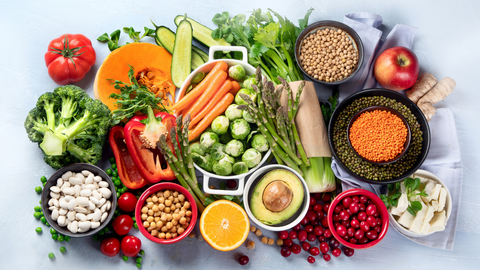If you are concerned about your diet and are looking to improve your body composition, you have probably asked yourself:
-
How many calories do I need to consume daily?
-
How does my level of physical activity influence?
-
How to calculate them to gain muscle or lose fat effectively and healthily?
-
Are there risks in running an excessive calorie deficit?
To answer these questions, it is essential to know how to calculate total caloric expenditure according to your metabolism, physical activity and objetivos specific. Let's see it step by step.
What are calories and why are they important?
Calories are the unit of measurement of the energy that we obtain through food and that we use to perform basic functions such as breathing, digesting food and moving.
The most common unit is kilocalorie (Kcal), which represents the amount of energy necessary to raise the temperature of one kilogram of water by 1ºC. It can also be measured in kilojoules (KJ), where 1 Kcal is equivalent to 4.184 KJ.
To maintain an adequate energy balance, we must calculate our total caloric expenditure and adjust intake according to our objetivos.
How to calculate total caloric expenditure?
Daily energy expenditure depends on several factors:
-
Basal Energy Expenditure (GEB): It is the minimum energy that your body needs for vital functions (respiration, blood circulation, body temperature, etc.).
-
Thermic effect of food (ETA): Energy used in the digestion and absorption of nutrients (approximately 8-10% of GEB).
-
Energy Expenditure by Physical Activity (GEAF): Energy expended on exercise and daily activities.
To obtain the total caloric expenditure, the following formula is used:
GET = (GEB x AF) + ETA
where AF is the physical activity coefficient, which varies depending on your activity level.
How to calculate Basal Energy Expenditure?
To calculate the GEB approximately, predictive equations can be used. The most common is that of Harris-Benedict:
-
Men: GEB = 66.5 + (13.75 x weight in kg) + (5 x height in cm) - (6.75 x age in years)
-
Women: GEB = 655 + (9.6 x weight in kg) + (1.85 x height in cm) - (4.7 x age in years)
Another more precise option is measurement using a gas analyzer, which evaluates resting metabolism through oxygen consumption and CO2 production.
Factors that influence total caloric expenditure
1. Physical activity level
To calculate the GEAF, the GEB is multiplied by a coefficient according to the level of activity:
-
Sedentary: 1.2 (little or no exercise)
-
Light activity: 1,375 (light exercise 1-3 days/week)
-
Moderate activity: 1.55 (moderate exercise 3-5 days/week)
-
High activity: 1,725 (intense exercise 6-7 days/week)
-
Athlete or extreme training: 1.9 (very intense exercise or demanding physical work)
2. Thermic effect of food (ETA)
ETA usually represents 8-10% of total caloric expenditure, since the body uses energy to process the food you eat.
3. Individual factors
Metabolism is not an exact number and varies depending on genetics, body composition (more muscle mass = greater caloric expenditure) and hormonal status.
How many calories do you need according to your goal?
Gain muscle mass (calorie surplus)
To increase muscle, you need to consume more calories than you expend.
Recommendations:
-
Increase intake in 300-500 Kcal daily
-
Increase protein to 2-3 g/kg body weight
-
Prioritize carbohydrates if the training is intense
-
Incorporate healthy fats if the training is moderate
Fat loss (calorie deficit)
To lose fat, you must consume less energy than you expend. However, an extreme deficit can be detrimental.
Recommendations:
-
Reduce between 300-500 Kcal daily
-
Maintain a protein intake of 1.8-2.5 g/kg weight
-
Increase physical activity instead of drastically reducing calories
-
Avoid going down 30 Kcal/kg of lean mass, as it could cause RED-S syndrome (relative energy deficiency in sport).
Weight maintenance
If your goal is to maintain weight, you simply have to balance caloric intake with daily expenditure.
-
Calculate the GET total and make sure you consume a similar amount of calories daily.
-
Adjust nutrition according to variations in activity level.

Now that you know how many calories you need, plan your diet and reach your goals! objetivos in a smart and healthy way!







Comments (0)
There are no comments for this article. Be the first one to leave a message!